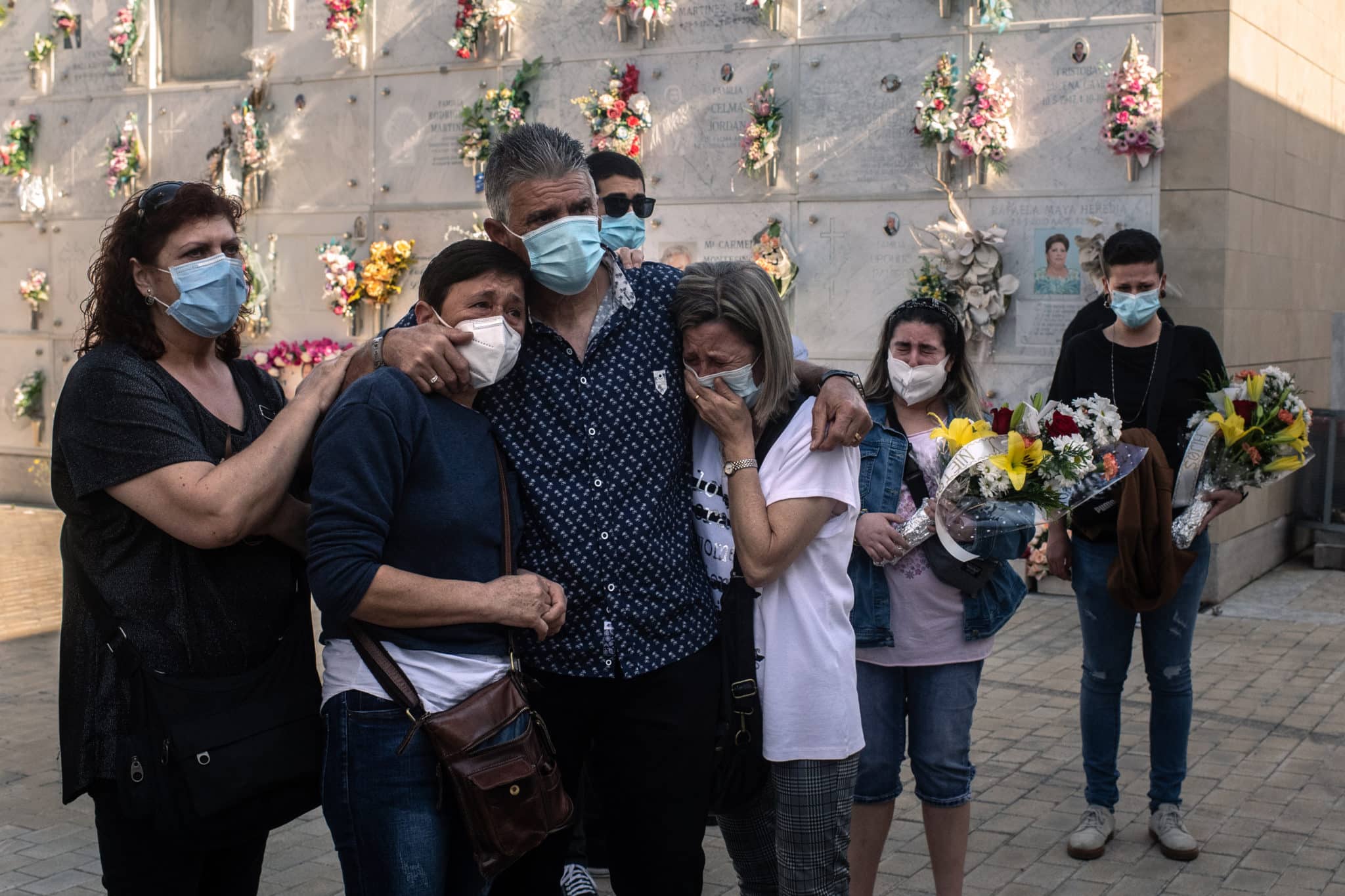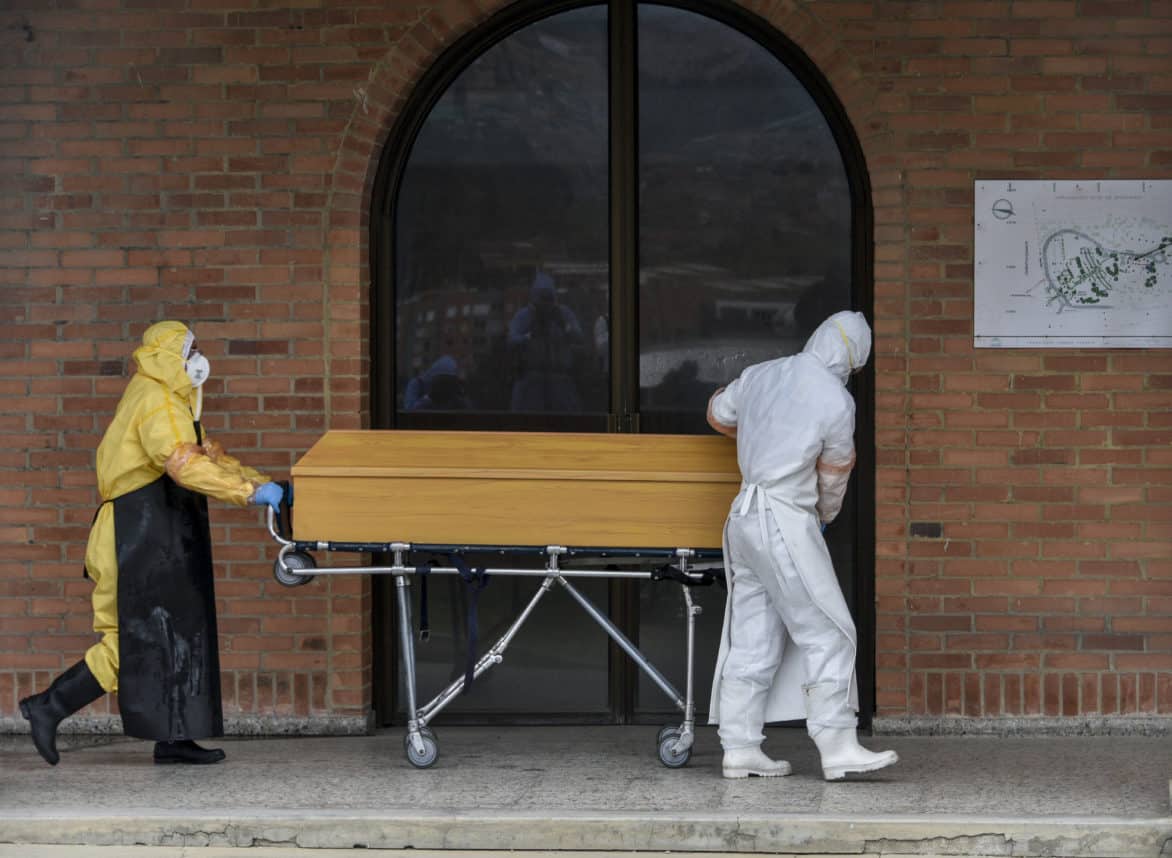 Francisco Baltanas (C) comforts his two sisters Isabel (2ndL) and Maria del Carmen during the funeral of their mother, Rafaela Carrillo, who died on March 26 due to a COVID-19 infection at the age of 85. (Photo by David Ramos/Getty Images)
Francisco Baltanas (C) comforts his two sisters Isabel (2ndL) and Maria del Carmen during the funeral of their mother, Rafaela Carrillo, who died on March 26 due to a COVID-19 infection at the age of 85. (Photo by David Ramos/Getty Images) The sobs came over the phone as Michael Beer described his father Ira’s lifelong commitment to Torah study and his family.
A victim of the COVID-19 pandemic that has killed hundreds of thousands of people across the world, Ira Beer had come to my attention during the course of my work on the Jewish Telegraphic Agency’s Bonds of Life project, which tells the story of the many Jewish victims of the virus. As I sat at a laptop in my living room listening to Beer’s son cry over the speakerphone, I fought hard to maintain my composure and provide a reassuring presence so he would feel comfortable enough to continue.
Over the past several months I had interviewed dozens of people like Beer, sometimes only days after the passing of a close family member. Parents, children and siblings would share cherished memories of their loved ones — funny stories, memorable vacations, the songs and books they loved. As they worked through their pain, what began as a journalistic undertaking often transformed into something akin to catharsis.
During one conversation, I listened as a mother described the loss of her 35-year old son, a pain exacerbated by being forced to sit shiva alone, receiving visitors only via Zoom or telephone because the risk of spreading further death through the traditional mourning process was too great.
Dealing with death is never easy, even for journalists who are expected to maintain an Olympian detachment from their subjects, chronicling everything yet (many seem to believe) feeling nothing themselves. And while reporters often manage to write with admirable objectivity, what we see and hear does affect us — often deeply.
One such incident occurred in 2014, when I covered the war in Ukraine for The Jerusalem Post. During an interview with Jews displaced by the fighting, Andrei Frumkin, a refugee from the separatist stronghold of Donetsk, described an incident reminiscent of the gory Normandy invasion scene from “Saving Private Ryan.”
In my book “Putin’s Hybrid War and the Jews,” I recalled the incident and its psychological effect on me:
Andrei was walking down the street one day when shells began raining down on the city. He threw himself on the sidewalk. As he hugged the ground, the rough pavement pressed against his body, he saw a woman, who had exited a nearby building only moments before, struck down by flying shrapnel. He was scuttling over to offer assistance when she suddenly stood up, one of her arms severed completely, and walked off, evidently in shock. After that, he told me, “it became impossible to be in the city anymore.”
A couple of nights later, in a hotel room in Dnipropetrovsk, I dreamed of Frumkin, imagining I was on the sidewalk with him watching bodies get torn apart. I woke up screaming and drenched in sweat. For several weeks after I had night terrors.
The following year, I covered a terror attack in my adopted hometown of Beit Shemesh, Israel, in which two Arabs armed with knives were shot to death by police after attempting to force their way on to a school bus. My daughter’s school bus passed through the neighborhood where the attack occurred and I had been walking my son to school when the first sirens went off. After making my way to the scene (where I took photographs of a pool of blood deemed too graphic for inclusion in the Post’s print edition) and filing my story, I finally allowed the fear to wash over me as I sat shaking at my desk.
The kind of suffering one encounters as a reporter is usually distinct enough from everyday experience to allow a measure of emotional distance. But covering a pandemic is fundamentally different.
For one thing, the health threat is one I face daily myself. I am an asthmatic and as such am considered a high risk for COVID-19. Early in the pandemic, I spent two days quarantined in my bedroom after I was alerted that I had come into contact with someone who had the virus. It turned out to be a false positive, but it was an intensely frightening experience.
Moreover, as I was writing obituaries, I had to worry about my own loved ones. Two of my cousins and a college buddy had caught the virus, although thankfully they all had relatively mild cases and survived. And my mother, who has survived three bouts with cancer over the past 15 years, lives in New York City, one of the worst coronavirus hot spots in the United States. She would occasionally tell me about victims in her own social circle.
Interviewing those in mourning also brought up memories of the afternoon in 2003 when I lost my own father. I was home from college for the summer and we were sitting together in the living room. I excused myself for several minutes and when I came back, he was sitting up on the couch, a vacant expression in his eyes. I came over and tried to wake him, but he was unresponsive. I tore out of the apartment and yelled for the doorman to call 911.

As the EMTs worked on my father on the living room rug, I walked into the lobby to intercept my mother, who was due back from work. Within minutes, he was gone.
Writing obituaries for JTA, all these memories came flooding back. In late April, I interviewed Devora Klein-Freeman about her father, Alex, who died in New York at the age of 70 on March 28. During our phone conversation, I kept thinking about my own father, who would have been 72 had he lived.
With every interview, my own emotional wounds were torn open anew and often I felt like crying as I listened to people going through the same mourning process through which I had passed 17 years ago. Listening to them while remaining outwardly calm was difficult, but necessary. Having gone through it myself, I understood that providing a listening ear was to allow them the chance to do something for the dead. With every interview, I wished I had been able to express my own feelings to a journalist who could have given my father the memorial he deserved.
My father loved the written word, a love he passed on to me. But more than that, he taught me to love truth and dislike hypocrisy, an attitude that ultimately led me to journalism. He was intensely intellectual — trips to bookstores and museums were a regular feature of my childhood — but not pretentious, and could get along with almost anybody. (Except for one neighborhood anti-Semite, who as the family legend goes, my father impersonated so that he could have the man’s utilities cut off one winter in the 1970s.)
Telling stories of the dead, while providing the living with a measure of solace through my work, isn’t just a matter of professional pride. It’s how I honor my own father — who, like the victims of COVID-19, was lost before his time.























 More news and opinions than at a Shabbat dinner, right in your inbox.
More news and opinions than at a Shabbat dinner, right in your inbox.